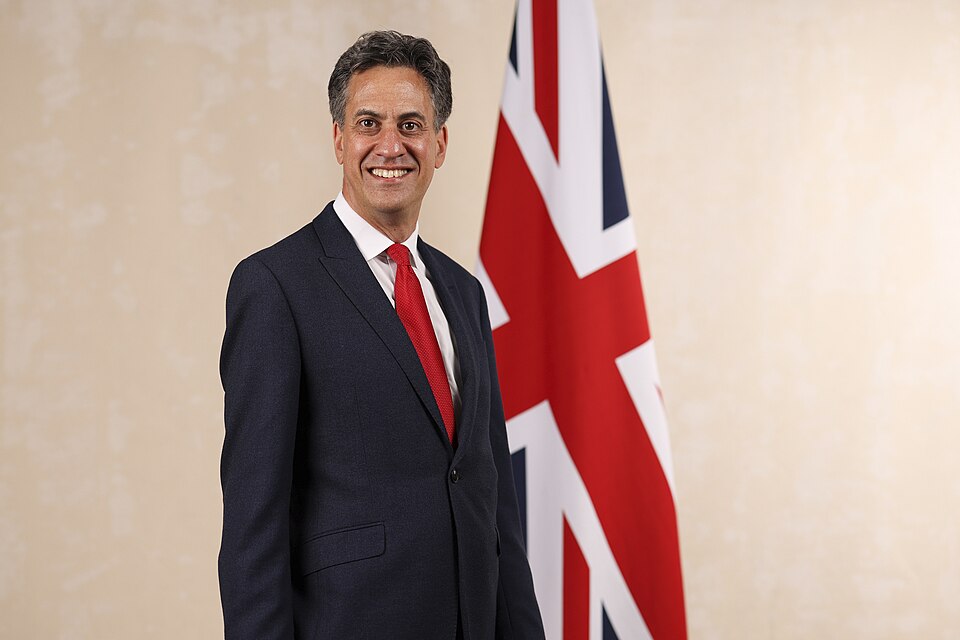
UK Energy Secretary Ed Miliband has launched a fierce attack on Nigel Farage and the Conservative Party, accusing them of spreading “nonsense and lies” by blaming the UK’s net zero climate
goals for damaging British industries like steel.
As the local elections loom, Miliband and senior cabinet ministers are pushing back against claims from Reform UK and the Tories that the net zero agenda is crippling businesses with high energy costs. Farage’s party has pointed to the crisis at British Steel’s Scunthorpe plant as a key example, attributing its struggles to the cost of renewable energy.
In response, Reform has called for a dramatic increase in oil and gas drilling in the North Sea—despite dwindling reserves and the fact that most extracted resources are exported, not used domestically.
This shift away from the long-held political consensus on climate action—mirroring similar moves by Donald Trump’s Republican party in the US—has sparked growing concern within the UK government.
At an upcoming International Energy Agency conference in London, Prime Minister Keir Starmer is expected to reaffirm Labour’s commitment to making Britain a “clean energy superpower.” Miliband echoed this stance in a Guardian Observer article, emphasizing that the push for clean power by 2030 is not just environmental—it’s essential for the UK’s economic and national security.
He pointed to the 2022 energy crisis, triggered by Russia’s invasion of Ukraine, as a wake-up call: “Our exposure to fossil fuels meant prices skyrocketed and families, businesses, and public finances were devastated. The impacts are still being felt today.”
Miliband warned that relying on volatile global fossil fuel markets leaves the UK vulnerable, adding that achieving energy independence through renewables is a matter of national security.
Taking direct aim at Farage and the Conservatives, he said they are “making up nonsense and lies to push their ideological agenda,” especially ahead of the 1 May elections, where Reform hopes to convert rising poll numbers into council seats.
Despite efforts from right-wing media to paint Miliband and Labour’s climate stance as out of touch, internal polling shows the party’s clean energy plans remain popular—especially the proposed state-owned Great British Energy (GBE), which includes installing solar panels on schools and hospitals.
Polling experts also suggest Reform and the Conservatives may be misjudging public sentiment. “Even Reform voters aren’t that driven by opposition to net zero,” said Luke Tryl of the polling group More in Common. “Voters across the UK are more concerned about climate change than not, and see renewables as a solution for energy security and lower bills.”
A Labour source added: “We’ll go after Kemi Badenoch and Farage on this. They want the UK at the mercy of Putin-controlled energy markets. We’ll make the case that climate action is national security.”
Farage, meanwhile, plans to tour 10 English counties this week to promote his anti-net zero stance and an unexpected call for nationalising British steel—typically a left-wing position.
But Miliband argues that abandoning the green agenda would not only worsen climate change, it would sacrifice the clean energy jobs of the future and a chance to revitalize the UK economy.
At a rally in Durham, Farage called for “reindustrialising” Britain through expanded domestic oil, gas, and coal production, claiming: “We should be absolutely self-sufficient.”
Experts and climate groups have dismissed this as a dangerous fantasy. Tessa Khan of the climate group Uplift noted that North Sea oil and gas reserves are rapidly declining due to natural depletion, not policy decisions. Official forecasts show the UK could be 94% reliant on gas imports by 2050, even with new fields.
Khan said: “Farage is copying Trump’s obsession with drilling, while ignoring that our oil and gas supplies are running out. And by opposing renewables, he’s risking the very jobs that offer a stable future.”
In reality, most remaining North Sea oil is exported, and extracting more would only be economically viable with high global prices or heavy government subsidies—neither of which benefit everyday consumers. Photo by Lauren Hurley / No 10 Downing Street, Wikimedia commons.




































